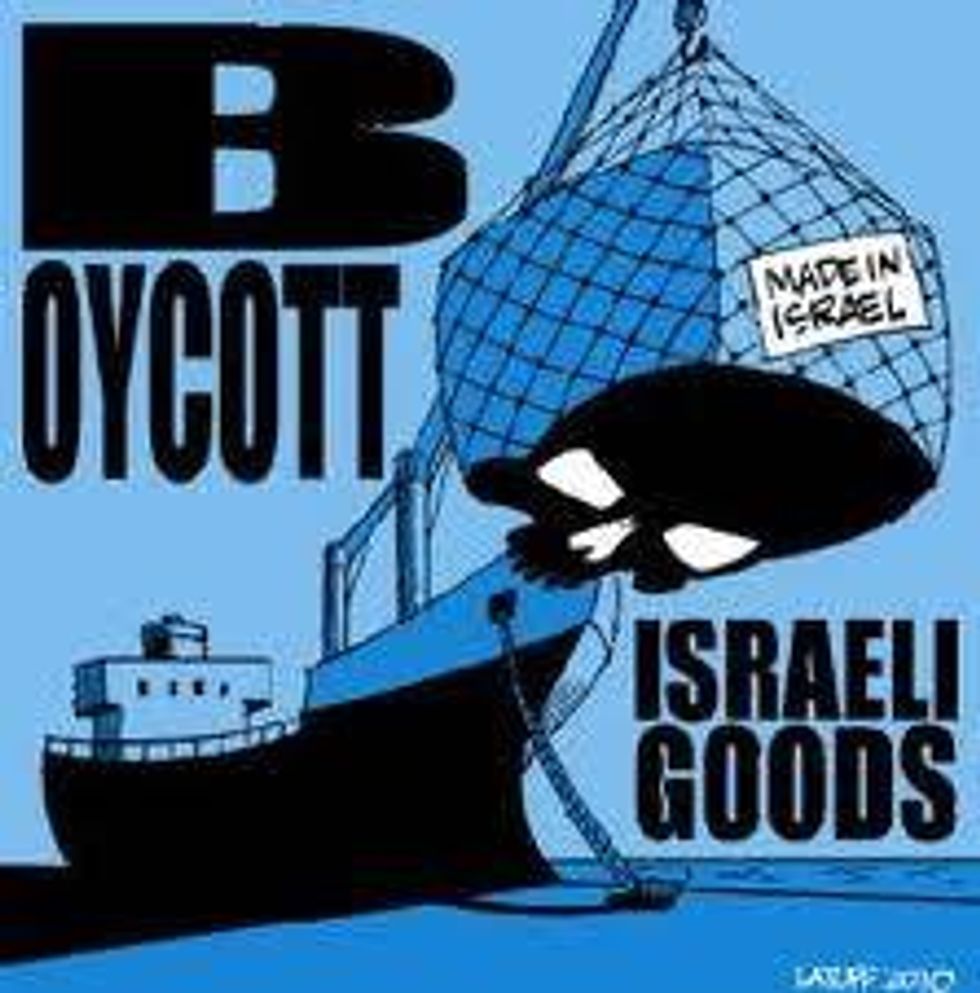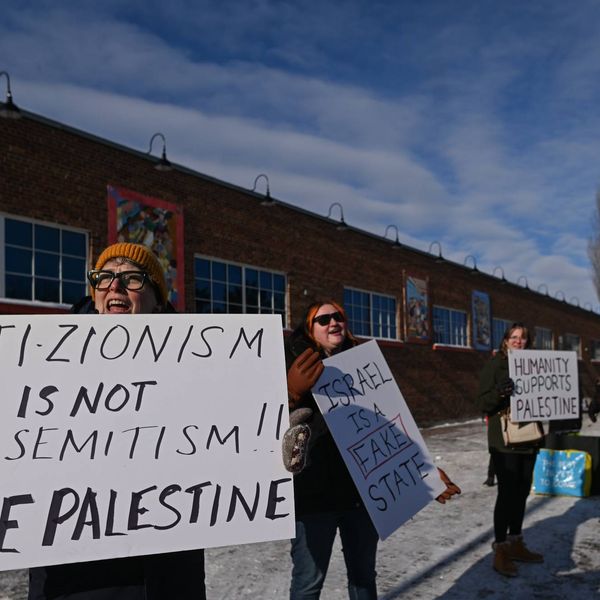Zionist BDS -- Kosher for Passover
History should mark March 18, 2012 as an important date on the road to a just and peaceful resolution of the Israel-Palestine conflict. That was the date on which an impeccably-Zionist American Jew -- Peter Beinart -- had an op-ed in the New York Times calling on American Jews to boycott the Israeli government colonization enterprise in the West Bank, a boycott campaign he dubbed "Zionist BDS"

The purpose of this campaign is to rescue the two-state solution to the Israel-Palestine conflict, because the Israeli government colonization project in the West Bank is an existential threat to the two-state solution, and if there is no external change in the situation -- an external change that increases pressure on the Israeli government to change course -- the clear trend is that the colonization project will destroy the two-state solution.
Beinart wasn't messing around. He didn't just call for American Jews to join in the consumer boycott of commodities (like Ahava cosmetics) produced in Israeli settlements in the West Bank, as the impeccably-Zionist Americans for Peace Now called for in July 2011. Beinart called on American Jews to "lobby to exclude settler-produced goods from America's free-trade deal with Israel," and to "push to end Internal Revenue Service policies that allow Americans to make tax-deductible gifts to settler charities."
As Beinart noted, American Jews who adopt "Zionist BDS" would simply be joining a campaign that Israeli peace advocates have already adopted. Prominent Israeli writers like David Grossman, Amos Oz and A. B. Yehoshua, Israeli actors, directors, and playwrights, and Israeli teachers are boycotting the Israeli government's colonization project in the West Bank.
In a thoughtful piece this week in The Atlantic, former Israeli official Daniel Levy of the New America Foundation praises Beinart for opening debate on the issue in the American Jewish community, and refutes arguments that have been advanced against Beinart's call.
In particular, Levy highlights the crux of the issue: Beinart's call gives American Jews the opportunity to choose sides against "two state posing." Since the two state solution isn't likely to happen without pressure against the West Bank colonization project, to claim support for two states while opposing pressure is to support a goal while opposing the means necessary to get there.
But Levy stops short of endorsing Beinart's call, saying: "Zionist BDS alone is unlikely to change Israeli policy."
That is no doubt true, but it overlooks a key point. The main point of Zionist BDS is to be an organizing tactic for public education and mobilization, especially in the Jewish community: an organizing hook for a "long march through the Jewish institutions," as Herbert Marcuse might have put it.
Polls have long shown that the majority of American Jews support the establishment of a Palestinian state. But that majority opinion has not yet been translated into action in Washington, because there is no Jewish political infrastructure yet capable of effecting the translation. There are no Jewish institutions with broad reach which are poised to effectively help American Jews "lobby to exclude settler-produced goods from America's free-trade deal with Israel," nor to "push to end Internal Revenue Service policies that allow Americans to make tax-deductible gifts to settler charities." If we went tomorrow to our representatives in Congress and asked for support for these measures, our representatives might well say: who's backing this campaign? As of this moment, in Washington political terms, we wouldn't have a very compelling answer. That doesn't mean we shouldn't try -- we have to start somewhere, and no such campaign is likely to be victorious on the first ask. It does mean that it makes sense also to think in terms of intermediate steps.
So on our way to demanding that settler-produced goods be excluded from the U.S.-Israel FTA, and that financial support of settler groups no longer be subsidized by U.S. tax dollars, we should consider some intermediate battles to build capacity, and to show Members of Congress that there is organized American Jewish support for U.S. government policies that put pressure on the West Bank colonization project.
The first step is to open debate. We need a broad, open debate in the American Jewish community on Zionist BDS, because that's a key step to getting the progressive edge of American Jewish opinion to start adopting it.
And Passover is the perfect time to start this debate, because Passover is a time for reflection and discussion on the obligations that Jewish history imposes on Jews to act effectively for social justice today. Is it righteous for an American Jew to purchase Ahava cosmetics, when this purchase supports the West Bank colonization enterprise that is blocking the two state solution? That's a question that every American Jew should be considering.
On Passover, we eat matzoh, the "bread of affliction," a symbol of slavery, but also a symbol of liberation. The transformation from oppression to liberation is a universal human story. Wouldn't it be wonderful if in the year to come we had a credible basis for celebrating the coming transition of the Palestinian people from oppression to liberation? Chag sameach!
An Urgent Message From Our Co-Founder
Dear Common Dreams reader, The U.S. is on a fast track to authoritarianism like nothing I've ever seen. Meanwhile, corporate news outlets are utterly capitulating to Trump, twisting their coverage to avoid drawing his ire while lining up to stuff cash in his pockets. That's why I believe that Common Dreams is doing the best and most consequential reporting that we've ever done. Our small but mighty team is a progressive reporting powerhouse, covering the news every day that the corporate media never will. Our mission has always been simple: To inform. To inspire. And to ignite change for the common good. Now here's the key piece that I want all our readers to understand: None of this would be possible without your financial support. That's not just some fundraising cliche. It's the absolute and literal truth. We don't accept corporate advertising and never will. We don't have a paywall because we don't think people should be blocked from critical news based on their ability to pay. Everything we do is funded by the donations of readers like you. Will you donate now to help power the nonprofit, independent reporting of Common Dreams? Thank you for being a vital member of our community. Together, we can keep independent journalism alive when it’s needed most. - Craig Brown, Co-founder |
History should mark March 18, 2012 as an important date on the road to a just and peaceful resolution of the Israel-Palestine conflict. That was the date on which an impeccably-Zionist American Jew -- Peter Beinart -- had an op-ed in the New York Times calling on American Jews to boycott the Israeli government colonization enterprise in the West Bank, a boycott campaign he dubbed "Zionist BDS"

The purpose of this campaign is to rescue the two-state solution to the Israel-Palestine conflict, because the Israeli government colonization project in the West Bank is an existential threat to the two-state solution, and if there is no external change in the situation -- an external change that increases pressure on the Israeli government to change course -- the clear trend is that the colonization project will destroy the two-state solution.
Beinart wasn't messing around. He didn't just call for American Jews to join in the consumer boycott of commodities (like Ahava cosmetics) produced in Israeli settlements in the West Bank, as the impeccably-Zionist Americans for Peace Now called for in July 2011. Beinart called on American Jews to "lobby to exclude settler-produced goods from America's free-trade deal with Israel," and to "push to end Internal Revenue Service policies that allow Americans to make tax-deductible gifts to settler charities."
As Beinart noted, American Jews who adopt "Zionist BDS" would simply be joining a campaign that Israeli peace advocates have already adopted. Prominent Israeli writers like David Grossman, Amos Oz and A. B. Yehoshua, Israeli actors, directors, and playwrights, and Israeli teachers are boycotting the Israeli government's colonization project in the West Bank.
In a thoughtful piece this week in The Atlantic, former Israeli official Daniel Levy of the New America Foundation praises Beinart for opening debate on the issue in the American Jewish community, and refutes arguments that have been advanced against Beinart's call.
In particular, Levy highlights the crux of the issue: Beinart's call gives American Jews the opportunity to choose sides against "two state posing." Since the two state solution isn't likely to happen without pressure against the West Bank colonization project, to claim support for two states while opposing pressure is to support a goal while opposing the means necessary to get there.
But Levy stops short of endorsing Beinart's call, saying: "Zionist BDS alone is unlikely to change Israeli policy."
That is no doubt true, but it overlooks a key point. The main point of Zionist BDS is to be an organizing tactic for public education and mobilization, especially in the Jewish community: an organizing hook for a "long march through the Jewish institutions," as Herbert Marcuse might have put it.
Polls have long shown that the majority of American Jews support the establishment of a Palestinian state. But that majority opinion has not yet been translated into action in Washington, because there is no Jewish political infrastructure yet capable of effecting the translation. There are no Jewish institutions with broad reach which are poised to effectively help American Jews "lobby to exclude settler-produced goods from America's free-trade deal with Israel," nor to "push to end Internal Revenue Service policies that allow Americans to make tax-deductible gifts to settler charities." If we went tomorrow to our representatives in Congress and asked for support for these measures, our representatives might well say: who's backing this campaign? As of this moment, in Washington political terms, we wouldn't have a very compelling answer. That doesn't mean we shouldn't try -- we have to start somewhere, and no such campaign is likely to be victorious on the first ask. It does mean that it makes sense also to think in terms of intermediate steps.
So on our way to demanding that settler-produced goods be excluded from the U.S.-Israel FTA, and that financial support of settler groups no longer be subsidized by U.S. tax dollars, we should consider some intermediate battles to build capacity, and to show Members of Congress that there is organized American Jewish support for U.S. government policies that put pressure on the West Bank colonization project.
The first step is to open debate. We need a broad, open debate in the American Jewish community on Zionist BDS, because that's a key step to getting the progressive edge of American Jewish opinion to start adopting it.
And Passover is the perfect time to start this debate, because Passover is a time for reflection and discussion on the obligations that Jewish history imposes on Jews to act effectively for social justice today. Is it righteous for an American Jew to purchase Ahava cosmetics, when this purchase supports the West Bank colonization enterprise that is blocking the two state solution? That's a question that every American Jew should be considering.
On Passover, we eat matzoh, the "bread of affliction," a symbol of slavery, but also a symbol of liberation. The transformation from oppression to liberation is a universal human story. Wouldn't it be wonderful if in the year to come we had a credible basis for celebrating the coming transition of the Palestinian people from oppression to liberation? Chag sameach!
History should mark March 18, 2012 as an important date on the road to a just and peaceful resolution of the Israel-Palestine conflict. That was the date on which an impeccably-Zionist American Jew -- Peter Beinart -- had an op-ed in the New York Times calling on American Jews to boycott the Israeli government colonization enterprise in the West Bank, a boycott campaign he dubbed "Zionist BDS"

The purpose of this campaign is to rescue the two-state solution to the Israel-Palestine conflict, because the Israeli government colonization project in the West Bank is an existential threat to the two-state solution, and if there is no external change in the situation -- an external change that increases pressure on the Israeli government to change course -- the clear trend is that the colonization project will destroy the two-state solution.
Beinart wasn't messing around. He didn't just call for American Jews to join in the consumer boycott of commodities (like Ahava cosmetics) produced in Israeli settlements in the West Bank, as the impeccably-Zionist Americans for Peace Now called for in July 2011. Beinart called on American Jews to "lobby to exclude settler-produced goods from America's free-trade deal with Israel," and to "push to end Internal Revenue Service policies that allow Americans to make tax-deductible gifts to settler charities."
As Beinart noted, American Jews who adopt "Zionist BDS" would simply be joining a campaign that Israeli peace advocates have already adopted. Prominent Israeli writers like David Grossman, Amos Oz and A. B. Yehoshua, Israeli actors, directors, and playwrights, and Israeli teachers are boycotting the Israeli government's colonization project in the West Bank.
In a thoughtful piece this week in The Atlantic, former Israeli official Daniel Levy of the New America Foundation praises Beinart for opening debate on the issue in the American Jewish community, and refutes arguments that have been advanced against Beinart's call.
In particular, Levy highlights the crux of the issue: Beinart's call gives American Jews the opportunity to choose sides against "two state posing." Since the two state solution isn't likely to happen without pressure against the West Bank colonization project, to claim support for two states while opposing pressure is to support a goal while opposing the means necessary to get there.
But Levy stops short of endorsing Beinart's call, saying: "Zionist BDS alone is unlikely to change Israeli policy."
That is no doubt true, but it overlooks a key point. The main point of Zionist BDS is to be an organizing tactic for public education and mobilization, especially in the Jewish community: an organizing hook for a "long march through the Jewish institutions," as Herbert Marcuse might have put it.
Polls have long shown that the majority of American Jews support the establishment of a Palestinian state. But that majority opinion has not yet been translated into action in Washington, because there is no Jewish political infrastructure yet capable of effecting the translation. There are no Jewish institutions with broad reach which are poised to effectively help American Jews "lobby to exclude settler-produced goods from America's free-trade deal with Israel," nor to "push to end Internal Revenue Service policies that allow Americans to make tax-deductible gifts to settler charities." If we went tomorrow to our representatives in Congress and asked for support for these measures, our representatives might well say: who's backing this campaign? As of this moment, in Washington political terms, we wouldn't have a very compelling answer. That doesn't mean we shouldn't try -- we have to start somewhere, and no such campaign is likely to be victorious on the first ask. It does mean that it makes sense also to think in terms of intermediate steps.
So on our way to demanding that settler-produced goods be excluded from the U.S.-Israel FTA, and that financial support of settler groups no longer be subsidized by U.S. tax dollars, we should consider some intermediate battles to build capacity, and to show Members of Congress that there is organized American Jewish support for U.S. government policies that put pressure on the West Bank colonization project.
The first step is to open debate. We need a broad, open debate in the American Jewish community on Zionist BDS, because that's a key step to getting the progressive edge of American Jewish opinion to start adopting it.
And Passover is the perfect time to start this debate, because Passover is a time for reflection and discussion on the obligations that Jewish history imposes on Jews to act effectively for social justice today. Is it righteous for an American Jew to purchase Ahava cosmetics, when this purchase supports the West Bank colonization enterprise that is blocking the two state solution? That's a question that every American Jew should be considering.
On Passover, we eat matzoh, the "bread of affliction," a symbol of slavery, but also a symbol of liberation. The transformation from oppression to liberation is a universal human story. Wouldn't it be wonderful if in the year to come we had a credible basis for celebrating the coming transition of the Palestinian people from oppression to liberation? Chag sameach!

